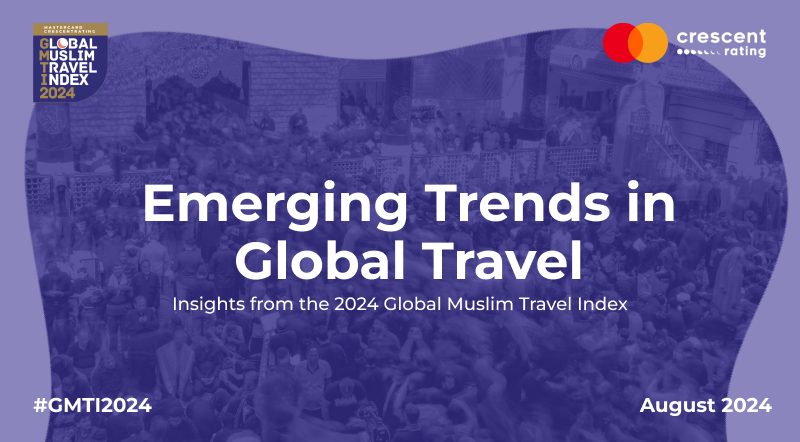
The Global Muslim Travel Index (GMTI) 2024, composed by Mastercard-CrescentRating, offers an in-depth look into the burgeoning Muslim population and its implications for the global travel industry. The report provides valuable insights into demographic trends, economic potential, and evolving travel preferences, painting a vivid picture of a market poised for substantial growth.
The Muslim population is projected to rise from 2.12 billion in 2024 to 2.47 billion by 2034. This increase of 0.35 billion over a decade represents 50% of the total global population growth during this period. The share of Muslims in the global population is also expected to rise, from 26.2% in 2024 to 28.1% in 2034. These statistics underscore the importance of the Muslim demographic in shaping future global trends.
A notable feature of the Muslim population is its youthfulness. In 2024, 70% of Muslims are under 40 years old, though this figure is expected to decrease slightly to 67% by 2034. Despite this small decline, the youth demographic remains significant, comprising 18% of the global population in 2024, and is projected to grow to 19% by 2034. This youthful composition presents unique opportunities and challenges for the travel industry.
In 2024, the largest segments within the Muslim demographic are the 0-10 and 11-20 age groups, indicating a high youth population. In contrast, the rest of the world shows a higher concentration in older age groups, particularly among those aged 31-40 and 51-60. By 2034, the Muslim population is expected to see substantial growth in the middle age groups (21-30 and 31-40), key demographics for economic activity, and travel propensity. Meanwhile, the rest of the world will witness a decrease in younger age groups and an increase in older segments (61-70 and 71-80), potentially shifting travel demands towards health and leisure-oriented experiences.
Saudi Arabia and the UAE rank among the top 10 OIC economies across three pivotal economic indicators: Total GDP, Households with Income greater than USD 250K, and GDP per Capita. This positioning underscores their status as affluent Muslim outbound markets. These economies are well-placed to influence the global travel market with their robust economic foundations and high disposable incomes.
Turkiye stands out as the only OIC economy to rank in the top 10 across all four key economic and demographic categories. This unique positioning highlights Turkiye’s significant role as both a source and destination in the global travel market. Its diverse offerings, from rich cultural heritage to modern attractions, make it a key player in attracting Muslim travelers.
Qatar, Kuwait, and Malaysia each hold prominent positions in the top 10 rankings for both households with income greater than USD 250K and GDP per capita, underscoring the significant economic stature of their populations. These countries exemplify the robust potential for growth in the travel sector, offering a combination of luxury experiences and cultural richness that appeal to affluent travelers.
Bangladesh, Egypt, Indonesia, Iran, Nigeria, and Pakistan represent significant potential within the Muslim travel market. These countries stand out with their large Muslim populations and growing middle class. Their presence in the top 10 rankings for Muslim population and total GDP highlights their importance in both inbound and outbound travel sectors. Except for Nigeria, all other five economies also feature in the top 10 by households with income greater than USD 250K, indicating rising economic prosperity.
The GMTI 2024 underscores the importance of understanding demographic and economic trends within the Muslim population. The projected growth in the Muslim population and their increasing economic clout present vast opportunities for the global travel industry. Destinations and travel service providers must adapt to the evolving needs and preferences of this dynamic market, leveraging technology and cultural insights to offer compelling travel experiences. As the Muslim demographic continues to grow and diversify, the travel industry stands at the cusp of a significant transformation, ready to embrace a future shaped by new generations of travelers.
Visit this link to download the GMTI 2024 full report!